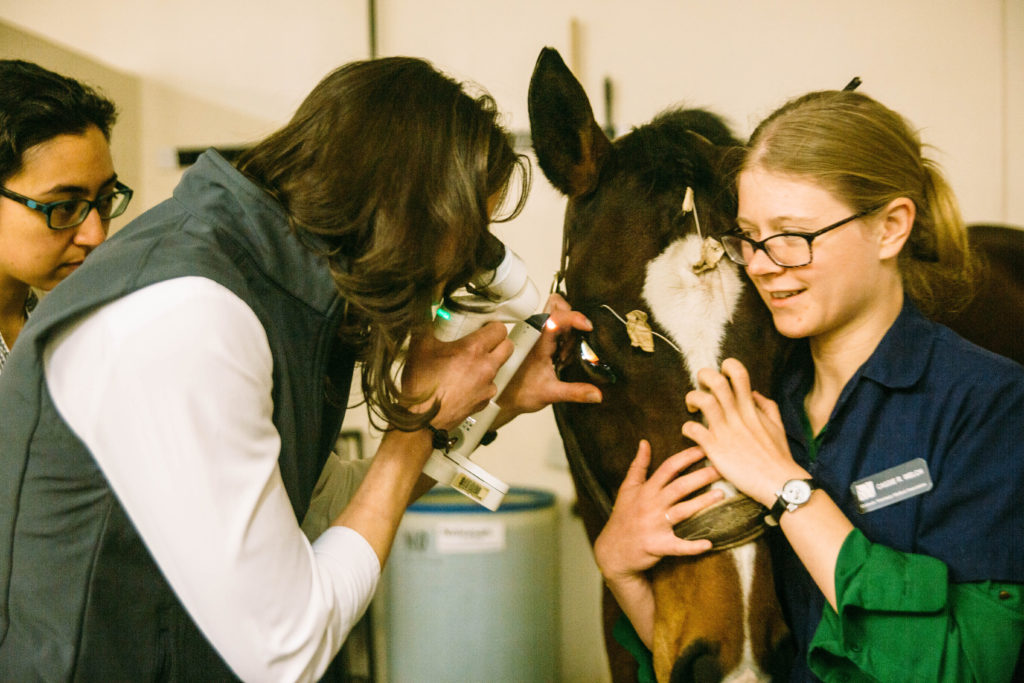
Novel Treatment for Ocular Squamous Cell Carcinoma Shows Success for Equine Patients
In a ground-breaking clinical trial, veterinarians at Colorado State University (CSU) have successfully treated ocular squamous cell carcinoma (SCC) in equine patients using a treatment developed for people with the human equivalent of the condition. Ocular SCC is the most common cancer affecting the equine eye and can be associated with vision loss and need for enucleation (removal of the eye), indicating the need for less invasive treatments. Researchers at CSU have used injections of interferon alpha-2b, a proinflammatory cytokine that has been successful in treating human patients, to reduce the size of tumors in equine eyes. In a clinical trial involving eleven equine patients (twelve eyes), the treatment led to reduced tumor size or complete regression of the tumor in five eyes (one patient was removed from the trial, and another was lost to follow up). In three patients, the tumor reduction was sufficient to allow for surgical excision of the tumor, which demonstrates the potential of using interferon alpha-2b treatments in conjunction with surgery.
The veterinarians at CSU have partnered with medical doctors at The University of Colorado – Anschutz, and the collaboration has helped to advance treatments for both humans and horses.
Dr. Kathryn Wotman, a veterinarian at CSU, stated, “Our collaboration with the group at Anschutz has allowed us to bounce ideas off each other, which has helped us to be more innovative.” The veterinarians are grateful for the opportunity to collaborate and are hopeful that other novel treatments developed for ocular SCC in the horse will one day be used to help people as well. The researchers at CSU have also benefitted from equipment developed for use in human patients and are very thankful for generous contributions to their project, including an X-ray radiation machine to be used for a new clinical trial. Dr. Karen Christopher, a medical doctor at CU Denver, shared Dr. Wotman’s feelings on the subject. She also stated, “You don’t know what you don’t know – working with new species has opened up a whole new world of possibilities for the advancement of medicine.”
Key benefits of the findings:
- Indicates the possibility of using horses as models for human conditions, including ocular squamous cell carcinoma. Horses may also serve as a model for humans with recurrent uveitis.
- Provides evidence that existing treatments can be used successfully to treat different species affected by similar diseases.
- Provides an example of the impact of the One Health, One Cure concept as human treatments can be used successfully in equine patients and existing treatments used in animals can inform treatments of human conditions.
Press releases:
https://thehorse.com/186457/novel-treatment-for-ocular-squamous-cell-carcinoma-looks-promising/
http://csu-cvmbs.colostate.edu/Documents/rdvm-newsletter-september-2019.htm
Case reports in human patients:
https://www.ncbi.nlm.nih.gov/pmc/articles/PMC6167668/
https://onlinelibrary-wiley-com.ezproxy2.library.colostate.edu/doi/full/10.1111/ceo.13000
ABOUT THE INVESTIGATORS:
Kathryn Wotman, DVM, DACVIM, DACVO
Karen Christopher, MD
One Health represents the “human-animal bond” that exists in medicine and science. “You can’t have one without the other, and collaboration drives science forward.” — Dr. Kathryn Wotman



